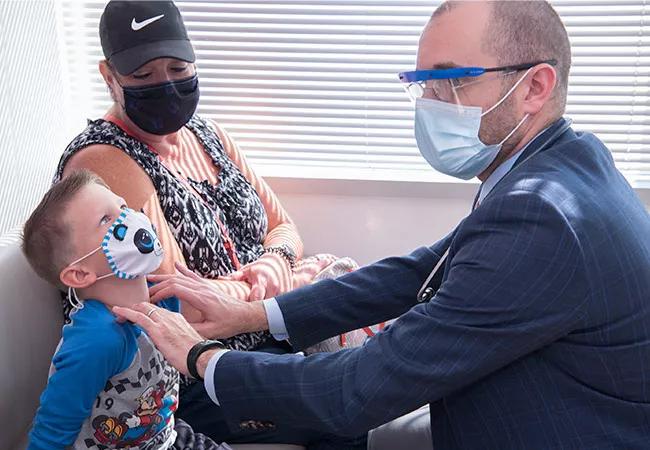Multicenter effort aims to standardize information about diagnosis and early management

Advertisement
Cleveland Clinic is a non-profit academic medical center. Advertising on our site helps support our mission. We do not endorse non-Cleveland Clinic products or services. Policy
Despite being the second most common bone malignancy seen in children and adolescents, only 200 to 250 cases of Ewing sarcoma are diagnosed in the United States annually. As such, while there is a good chance a patient with Ewing sarcoma is receiving care at a pediatric oncology practice, it is difficult for centers and practitioners to see the volume necessary to truly acquire expertise with this rare and challenging tumor.
The management of these patients is further complicated by heterogeneous presentations, including long bones, axial skeleton, chest wall, soft tissue and occasionally tumors arising in organs. In addition, while collaborative groups and even international trials have attempted to standardize the management, at least upfront, of Ewing sarcoma, the literature and data are often murky or incomplete, leading to many questions and confusion about how to treat patients with the disease.
In 2021, a generous donation from the Carson Sarcoma Foundation to support the laboratory research of Jacob Scott, MD, DPhil, a physician-researcher at Cleveland Clinic, helped facilitate a comprehensive and multidisciplinary initiative to connect Ewing sarcoma specialists across Cleveland Clinic and in large sarcoma centers throughout the U.S.
To achieve this, the National Ewing Sarcoma (NEWS) Tumor Board, a monthly virtual tumor board with multidisciplinary experts in Ewing sarcoma from across the country, was established to discuss challenging cases and provide education about various strategies to manage the disease, including clinical trials available throughout the country. Since July 2021, the NEWS Tumor Board has been held monthly with, on average, 40 oncologists, surgeons, radiation oncologists, radiologists and pathologists in attendance. Typically, one to four cases are discussed during each tumor board.
Advertisement
We took advantage of the combined expertise of the participants of the NEWS Tumor Board and wrote a manuscript that highlights and provides consensus and guidance on some of the questions frequently encountered in the management of Ewing sarcoma. It was quickly determined that one paper was not sufficient to address all the questions surrounding Ewing sarcoma management, so questions regarding the upfront management of newly diagnosed Ewing sarcoma were chosen for the first manuscript. In July 2023, the first consensus paper of the NEWS Tumor Board was published in Cancer.
This collaborative effort aimed to answer questions regarding the most appropriate workup and management for Ewing sarcoma patients. Most notably, we address topics related to workup, including PET/CT versus bone scan and the necessity of bone marrow evaluation. Regarding treatment, topics range from the use of interval compressed therapy in adult patients, the appropriate number of chemotherapy cycles, the discrepancy between current accepted practice and past studies for the addition of ifosfamide/etoposide in patients with metastatic disease, the role of high-dose chemotherapy with autologous stem cell rescue for the upfront treatment of Ewing sarcoma, the role of maintenance chemotherapy, and the role of whole lung radiation.
The data on many – if not all – of these topics is sparse, incomplete, old, conflicting and controversial. This group of experts, organized by the team at Cleveland Clinic, sought to shed light and insight on these topics and offer consensus statements to help guide clinicians who are treating patients with this challenging and often frustrating disease. We are heartened that the paper has been well-received, including from reviewers who have extolled its value. To date, it has received more than 600 full-text views on the journal’s website.
Advertisement
A second manuscript is in preparation addressing common questions and issues related to the management of Ewing sarcoma in the relapsed setting along with additional papers that are being proposed and discussed.
About the author: Dr. Trucco is staff in Cleveland Clinic Children’s Department of Hematology, Oncology and Blood and Marrow Transplantation.
Advertisement
Advertisement

An expert’s take on evolving challenges, treatments and responsibilities through early adulthood

Comorbidities and medical complexity underlie far more deaths than SUDEP does

Case study of radial-to-axillary nerve transfer for tumor-related deltoid nerve injury

Study also finds that 26% of children with cancer have mutations in DNA repair genes

Tapping into motivational interviewing to guide behavioral change

Case-control study yields evidence of epigenetic aging in pediatric-onset MS

Leaders of the Pediatric Cancer Committee discuss new accreditation

Complex disease requires a comprehensive approach